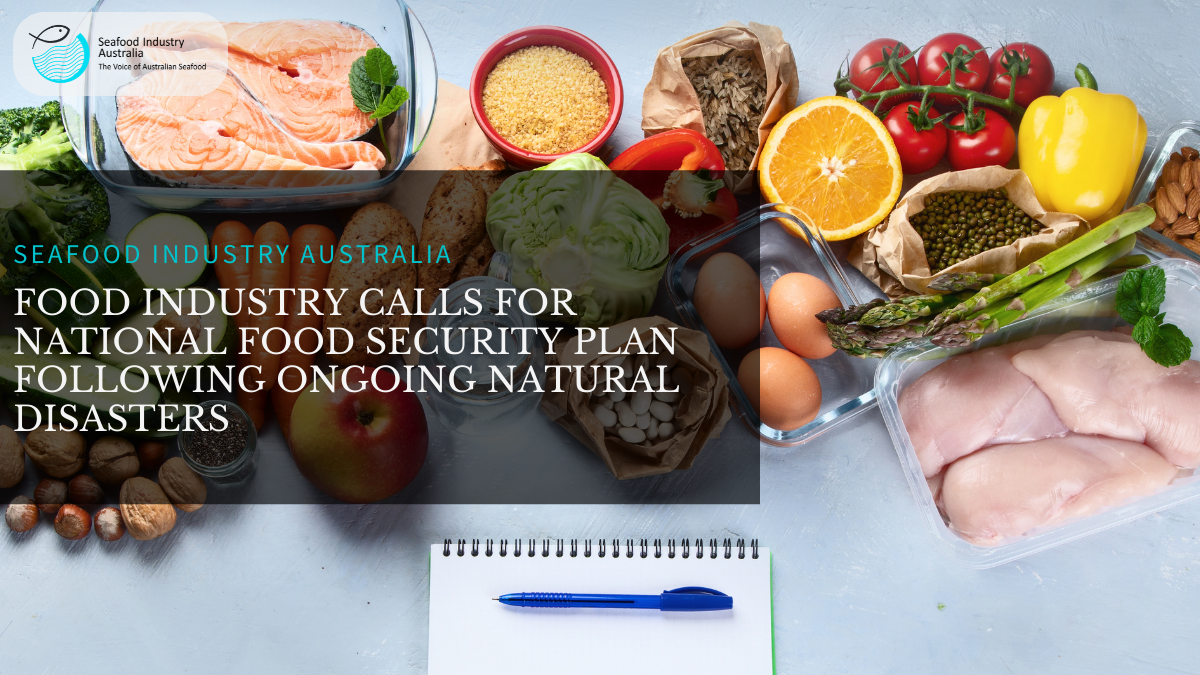
FOOD INDUSTRY CALLS FOR NATIONAL FOOD SECURITY PLAN FOLLOWING ONGOING NATURAL DISASTERS
Political bi-partisan support needed to protect consumers from sky rocketing food prices
The National Food Supply Chain Alliance, made up of nine influential national food industry associations, representing over 165,000 food businesses, is calling for the urgent establishment of a National Food Security Plan following unprecedented, long-term threats to its domestic food supply chain including ongoing natural disasters.
It believes the absence of a national plan has the potential to jeopardise the functioning of the economy, national security, and Australians’ wellbeing.
The Alliance, which represents every component of the nation’s food supply chain from paddock to plate, says food inflation will continue to rise unless a co-ordinated, national food supply chain strategy is adopted. A national strategy will help stabilise future food price fluctuations, and provide consistent, dependable access to sufficient volumes of food for domestic consumption.
It says it is critical in the world in which we now live, with more regular, more severe climatic events, that we examine all aspects of the nation’s food supply chain to ensure we become more resilient, self-sufficient, agile and flexible to cope with supply and demand shocks. It says recent threats have laid bare the nation’s food supply chain’s dependencies, risks, and vulnerabilities.
Other disruptors that impact Australia’s food supply chain, apart from natural disasters, include geo-political tensions, ongoing labour shortages, transport and logistics issues, financial challenges through rising cost of business, and future human and animal disease outbreaks.
The Alliance says despite countless reports and research in recent decades, Australia has failed to produce policy adoption and the implementation of a nationally co-ordinated, risk mitigation food supply chain strategy. All the potential disruptors to our food supply chain have never been brought together under ‘one’ co-ordinated national strategy.
The Alliance believes government and industry must work together to fully understand the complexities of the food supply chain and examine how specific events might impact the various pieces of the food supply chain jigsaw puzzle. This approach must incorporate the entire ‘living’ food supply chain eco-system, from paddock to plate, encompassing production, processing, distribution, retail, consumption, and disposal.
From the perspective of both government and industry, research has shown there are many social and economic benefits from a more efficient, more sustainable, and self-sufficient national supply chain. It will provide more stability to food related businesses, boost innovation and technology, enhance the nation’s food processing capacity, create jobs and, most importantly, provide the community with the confidence it needs in the nation’s food security.
Recommendation: That Australia urgently establish a National Food Security Plan. Chaired by the responsible Minister, with input from multiple other relevant portfolios, and working with the support and technical guidance of a Food System Advisory Reference Group made up of representatives across all aspects of the food supply chain. The Group will review recommendations and help with the adoption of industry-wide initiatives that will help eliminate the current risks and disruptions in the system.
What is the National Food Supply Chain Alliance
The National Food Supply Chain Alliance (NFSCA) represents all facets of Australia’s food supply chain from farmers, processors, grocers and butchers, independent supermarkets, convenience stores, wholesale suppliers and distributors to food retailers including cafes, restaurants, hotels, and clubs. In total, the nine national food industry associations represent over 165,000 businesses with a combined revenue of a staggering $200 billion and who employ almost 1 million workers.
The Associations include: The National Farmers Federation (NFF), Australian Meat Industry Council, (AMIC), Independent Food Distributors Australia (IFDA), Master Grocers Australia (MGA), the Australian Association of Convenience Stores (AACS), AUSVEG, Seafood Industry Australia (SIA), the Restaurant and Catering Industry Association and the Refrigerated Warehouse and Transport Association of Australia.
Contact: Richard Forbes CEO – Independent Food Distributors Australia – 0427 270 687




